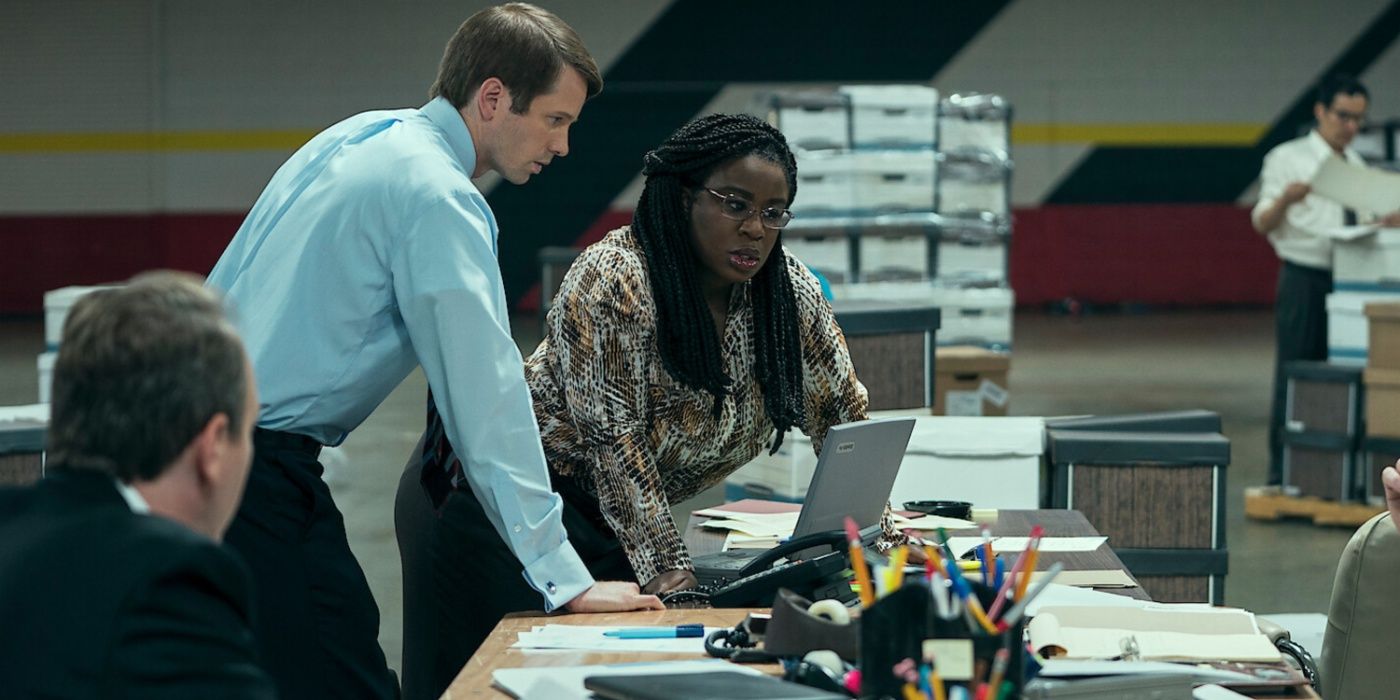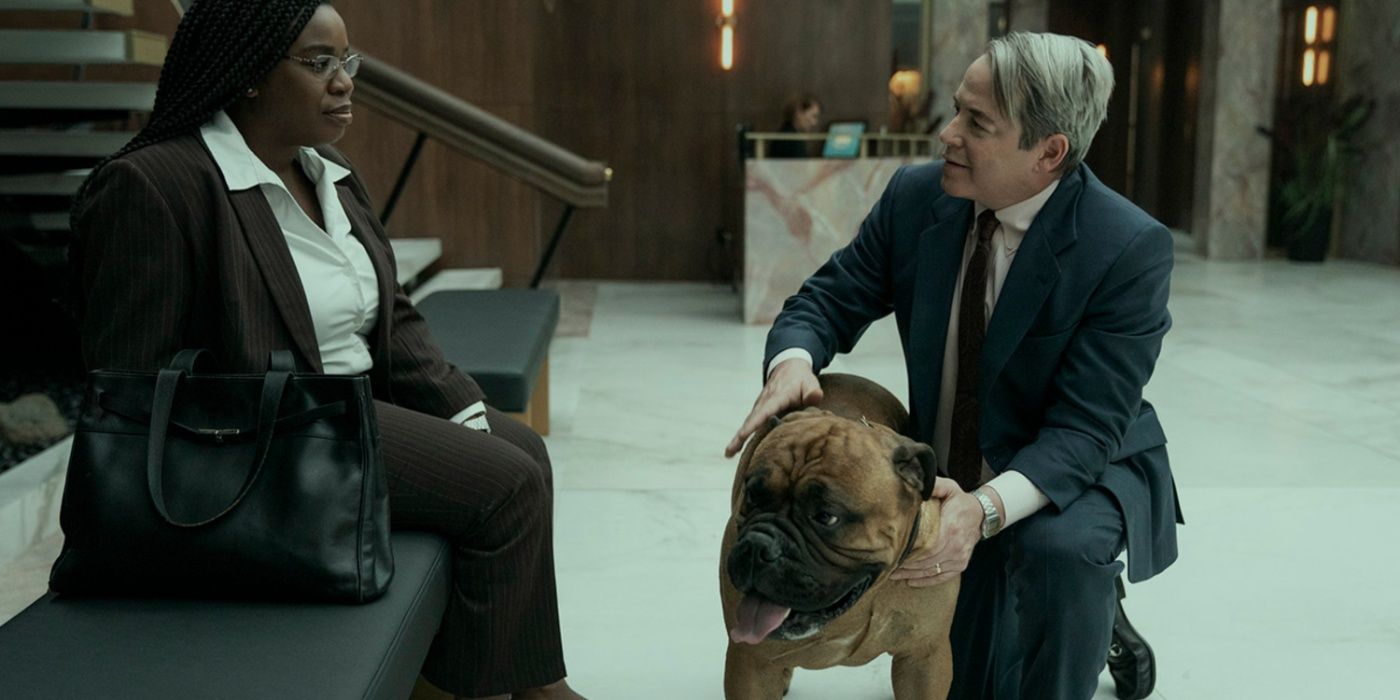Summary
- Painkiller is a Netflix miniseries that takes a fictionalized approach to exploring the events that led to the opioid epidemic in America.
- The show provides multiple perspectives on the story, including investigators, the Sackler family, drug reps, and those affected by addiction.
- The cast, led by Uzo Aduba and Clark Gregg, delivers standout performances, bringing authenticity and depth to their characters.
Painkiller is a fictionalized retelling of the events that led to the opioid epidemic in America. The show depicts the origins of OxyContin's invention, the marketing scheme that got so many doctors prescribing it and so many patients addicted to it, and how one family started this chain of events. The miniseries tells this story from the perspectives of investigators, the Sackler family, the drug reps, and the people whose lives were destroyed by OxyContin.
Painkiller stars a powerhouse cast led by Uzo Aduba, Clark Gregg, Matthew Broderick, Sam Anderson, Taylor Kitsch, Carolina Bartcza, Tyler Ritter, John Ales, Ron Lea, Ana Cruz Kayne, and West Duchovny. Micah Fitzerman-Blue and Noah Harpster created and wrote Painkiller based on Patrick Radden Keefe's "The Family That Built an Empire of Pain" and Barry Meier's Pain Killer: An Empire of Deceit and the Origin of America’s Opioid Epidemic. The Netflix miniseries is directed by Peter Berg.
Screen Rant spoke with executive producer Eric Newman and consulting producer Barry Meier about the new Netflix miniseries Painkiller. Newman praised Aduba and Gregg's performances, and Meier discussed bringing the story from his book to life in the Netflix series. Newman also shared his excitement for another Netflix project he is producing, Zack Snyder's sci-fi epic Rebel Moon.
Eric Newman & Barry Meier Talk Painkiller
Screen Rant: Oh my god, this show is so good! I was hooked immediately and it's so powerful!
Barry Meier: That's great!
Eric Newman: That's great to hear!
Barry Meier: Good news!
Eric Newman: Never get tired of hearing that.
The cast is phenomenal, but Uzo Aduba and Clark Gregg really stand out to me. What did they each bring to their performances that kind of brought it beyond what was first written on the page?
Eric Newman: Well, thank you for noticing that. I think we were very, very careful about who we put in the show, obviously, because authenticity is so important and some of the parts are pretty challenging. Uzo's I think, one of the best actresses of her generation. She's phenomenal and she had an incredibly important part because she was sort of our audiences window in to this story.
She's loosely based on a number of people, including Barry who noticed early on that something was wrong here before OxyContin became the story it became, it relied on people like Barry going, "Wait, something's off here." So, she had to play not only a naive, who becomes an expert, but also the stakes of the show are very much the justice that she seeks, and it's a bit of a spoiler alert, fails to find. And so that was essential.
Clark is as an old friend of mine, and a phenomenal actor and we knew that he would really embrace the part of playing Arthur Sackler. A guy who is sort of an anachronism and a shameless marketer. Which is why the epidemic happened because of the influence of Arthur. So no, we really, I think, lucked out with our cast.
Barry, what was it like to see this brought to life in this Netflix show? And why was it important to shift perspectives throughout not just following Eddie's story, but seeing the executives and people that are using OxyContin and the drug reps?
Barry Meier: Well, I wrote this book in 2003. It's been this, for me, an incredible journey, a two-decade-long journey from the story I wrote, to the show that's now coming out. And in the book, I'm not in the book. There is an investigative character, there are these attorneys that are investigating, but the book really revolves around the marketing of OxyContin, the Sacklers, the character of Arthur Sackler and how his mad genius affected what would become the marketing scheme used to promote Oxycontin.
About the failures of everyone who was around, public health officials, professional medical organizations, regulators, from stopping this tragedy from happening. And I think in the show, this scenario also plays out, because you keep wanting to say, "Wait a minute! This is crazy. Can't someone stop it from happening?" And the tragic, sad answer is that no one did it.
Yeah, I was shocked by just the systemic failure and corruption that led to all of this.
Barry Meier: Yes, it was there in spades. Yes.
Can you talk to me a little bit about the research process of who you spoke with? I have addiction in my family and seeing how that spirals for people felt so real.
Eric Newman: Unfortunately, there are no shortage of experts. It's one of the great tragedies of this story is that everyone, yourself included, everyone knows someone. Everyone's lost somebody. And so we didn't have to go very far. Taylor [Kitsch] speaks pretty openly about his experience having a loved one and I've had my own experience with loved ones. Taylor's fortunately, his loved one prevailed in her struggle against opioids, mine didn't. And I think that there was no shortage of people who, including the parents in our disclaimers, every episode opens with a parent reading our disclaimer and talking about their child. So there was no shortage.
And then we had Barry always and we had Patrick Radden Keefe and we had Alex Gibney. All three of whom have made contributions to making people aware of the perils of OxyContin and opioid addiction. But the saddest thing is that it's touched so many people, and it's also the reason why it was so important that we do this and tell this story and make sure it reaches as many people as possible.
And one of a number of great things about Netflix is their audience is enormous. And if we can get to 10% of them, that's almost 30 million people who can see this story and and say, "Wow, I had no idea that my doctor was doing me a great disservice when he put me on OxyContin told me not to worry about it. It's not addictive. And if it's not working, just take more."
Eric, you're also working on another Netflix project I'm very excited for with Rebel Moon. Can you tell me a little bit about bringing that very original sci-fi epic to life?
Eric Newman: Zack Snyder and I made our first movie together many years ago, Dawn of the Dead, which is still one of the highlights of my career experience. And we've stayed friends. And we had been talking for a long time about doing and there was a moment where he was hoping it'd be part of the Star Wars universe, but to do sort of a Magnificent Seven in space type story. The world unfortunately, has sort of become more than ever, there's always the threat of totalitarianism and we who must unite against it. It's more relevant now than it ever was.
And Zack had just finished Army of the Dead at Netflix, and I'm based at Netflix, and it just sort of made sense that Zack and Debbie, and I, and Wes would do this together. It's been so fun. It's a massive movie. I would sometimes drive on to set and I would look out in the distance and think like, "Could that possibly be part of our show?" And it always was. It's the biggest thing I've ever done and it's really cool. I'm excited for people to see it. I think you'll love it!
About Painkiller
A fictionalized retelling of events, Painkiller is a scripted limited series that explores some of the origins and aftermath of the opioid crisis in America, highlighting the stories of the perpetrators, victims, and truth-seekers whose lives are forever altered by the invention of OxyContin.
Painkiller premieres on Netflix on August 10.
Source: Screen Rant Plus




